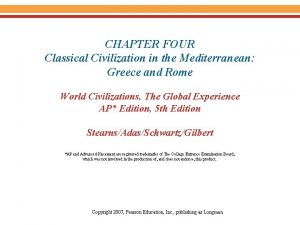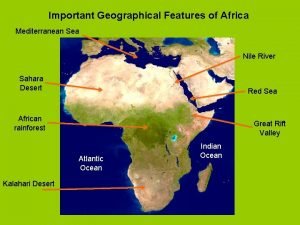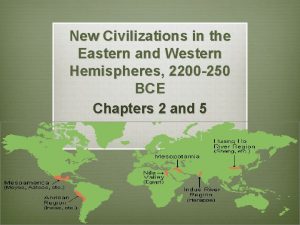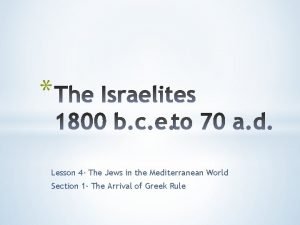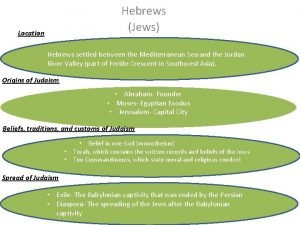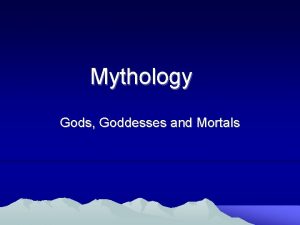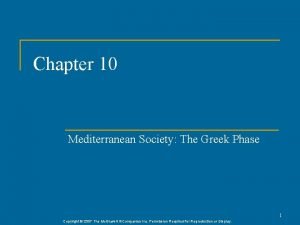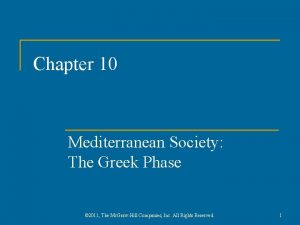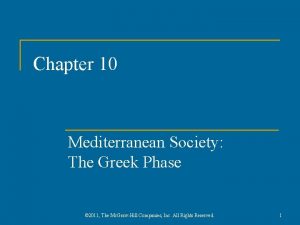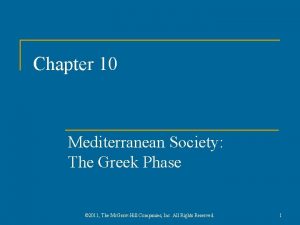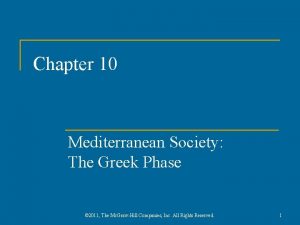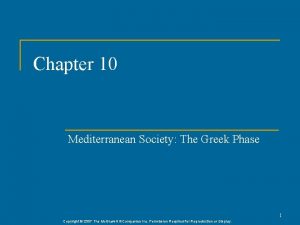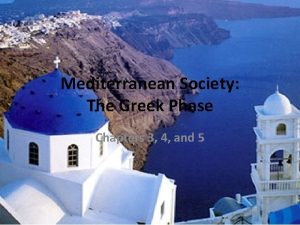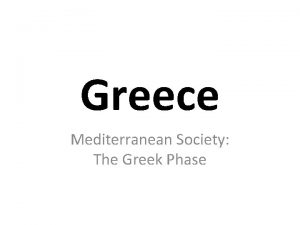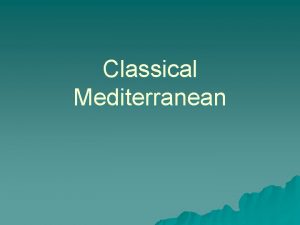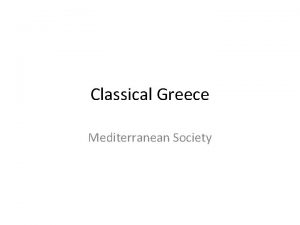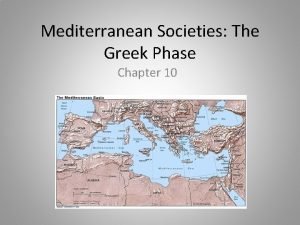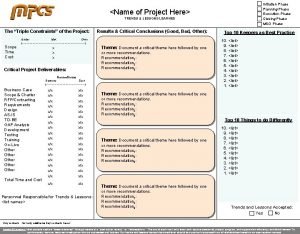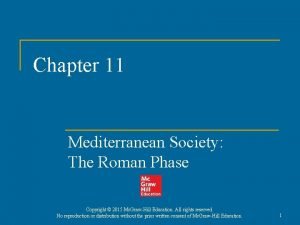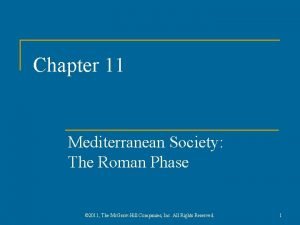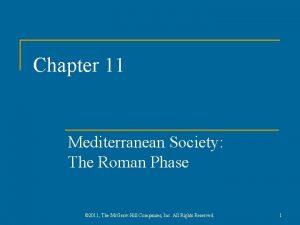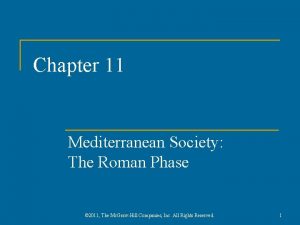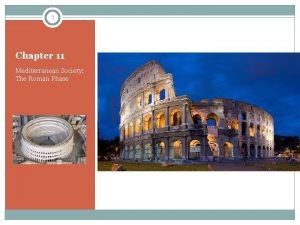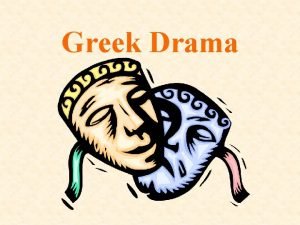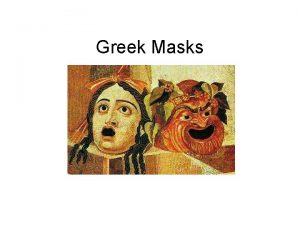Mediterranean Society The Greek Phase Chapter 10 The



























































- Slides: 59

Mediterranean Society: The Greek Phase Chapter 10

The Sea • The geography of Greece had a huge influence on the way early Greeks lived. • Greece lies on a southern part of the Balkan Peninsula, and points southwards into the Mediterranean Sea. • The Aegean Sea is to the east and the Ionian Sea is the west. • Because of Greece’s long, uneven, coastline many Greeks became fishermen, sailors, and traders.

Classical Greece, 800 -350 B. C. E. 3

Physical Geography and its Impact • Greece’s geography made it hard for early people to have a sense of unity. • Short mountain ranges and small island chains kept villages and people groups apart from each other. • Because of this isolation, separate city-states began to emerge.

Minoans • The first civilization in Greece was the Minoan civilization on the island of Crete around 2000 BCE. • The Minoan civilization was named after its founder and ruler, King Minos. • His palace and capital city was at Knossos. • The palace was cover with frescoes-paintings made on wet plaster walls. • The Minoans worshipped the bull and an Earth goddess • In 1628 BCE, a volcano erupted on a nearby island. • Tidal waves caused by the eruption destroyed most of the island, and severely weakened the Minoan government.



The Mycenaeans • The Mycenaeans controlled mainland Greece from 1600 BCE-1200 BCE. • There were a warring people who grouped themselves into clans and tribes. • Their main cities were built in a fort-like style. • They developed a form of writing called Linear B that was an early form of the Greek language. • By 1200 BCE, a combination of earthquakes and wars had destroyed most of the Mycenaean cities.

Linear B

Greek Alphabet

The City-States of Greece • During the 800 s and 700 s BCE, the Greeks began to form a number of independent citystates. • The Greek word for city-state is polis. • The polis was usually developed around a fort. • Over time the polis came to represent the center of Greek identity and its inhabitants were intensely loyal to. • Each polis was completely separate from one another socially, politically, and economically.

City-States • The largest Greek city-states were Athens and Sparta. • Most city-states had less than 10, 000 people and the population was mostly slaves and non -citizens. • In order to be citizen of a polis you had to be a free adult male. • Each polis had an acropolis or hill where temples and public buildings. • Each polis also had an agora or marketplace that served as a public meeting place.


Sparta: History and Geography • Around 1100 BCE, invaders from the North conquered the area of the Peloponnesus Peninsula. • These invaders forced the indigenous people to work for them and treated them harshly. • The conquered, native people were called helots. • These invaders founded the city-state of Sparta was in a mountain valley; the city had no walls for protection.

Spartan Life • The polis controlled the life of Spartans from infancy until death. • Children were inspected at birth to see if they were healthy enough to survive a Spartan life. • Boys left home at the age of 7 and could not return home until the age of 30. • Girls stayed at home but were put through physical training to prove they could be healthy wives and mothers of future Spartan soldiers.


Athenian Society • Strongly patriarchal • Like Sparta, Athens had three social classes: • Citizens, Metics, Slaves • Citizens were the top class, but were given the title because they were born in Athens, not because of heritage. • Metics were people born outside of Athens. They had no voting rights. • Slaves had no rights at all. If they were freed they became Metics.

Athenian Government • Archons or generals were elected in times of war, but some who came to power abused it. • Draco was a tyrant and Archon who wrote Athens first law code. • It was so harsh that even today, harsh laws are referred to as Draconian Laws. • In 507 BCE, Cleisthenes seized power and turned Athens into a democracy.

The Athenian Economy • Most Athenians were poor farmers who grew olives, grapes, and figs. They planted these on terraced hillsides. • Terracing means to carve small, flat plots of land out of the hillside. • Trade was a major part of the economy. • Athens exported olive oil, wine and other household items while they imported grain and other foods.

Greek Colonization • Population expansion drives colonization • Coastal Mediterranean, Black Sea • • Sicily (Naples: “Neapolis, ” new city) Southern France (Massalia: Marseilles) Anatolia Southern Ukraine Effects of Greek Colonization �Trade throughout region �Communication of ideas � Language, culture �Political and social effects

Classical Greece and the Mediterranean Basin, 800 -500 B. C. E.

Home Life • Athenians believed that money should be spent on buildings to benefit the whole community, not on private homes. • Because of this belief, many homes were simple, one story structures made out of sun-dried brick with no plumbing.

Women in Ancient Athens • Marriage was an important part of life. Parents always arranged the marriages. Girls would marry at 13 or 14 while their husbands might be twice that age. • Women were considered inferior to men, and their main duties were supervising the slaves, children, and the household. • Girls learned to run a household, but did not receive a formal education. • Sappho (c. 610 -c. 580 BC) is a rare exception.

Early Education in Athens • Mothers took care of their children until the age of 7. At that time boys came under the care of their pedagogue. This was a male house slave that taught the boys manners. • Boys could also be sent to elementary school for a small fee. There they would study reading, writing, grammar, poetry, music, and gymnastics. They would learn to recite the epics of Homer by heart!

Secondary Education in Athens • The school for older boys was run by the Sophists. There they learned government, mathematics, ethics, and rhetoric. • Ethics deals with what is good, bad, and moral duty. • Rhetoric is the study of oratory or public speaking, and debating. • At 18, men received a year of military training. • The Greeks’ focus on education help to spread their culture and ideas across the known world.

The rise of the Aristocrats • The city-states of Greece had originated as small kingdoms ruled by warrior chieftains from their hilltop fortresses. • The chieftains had to rely on wealthy landowners to run and fund their armies • Over time this group of landowners became know as the aristocrats or “best men” in Greek. • By 700 BCE, the aristocrats had thrown over their rulers and took the power for themselves.

Aristocracy • Greek city-states that were controlled by nobles were known as aristocracies. • Originally, the word aristocracy meant “rule by the best” • Over time, the aristocracy came to represent a privileged social class that was composed of the wealthiest landowners in the city-state.

Hoplites • Around 600 BCE, there was a shift in many Greek economies and some non-aristocrats began to grow wealthy. • Now those who were not aristocrats could afford weaponry and stand up for themselves. • A new kind of non-aristocractic soldier called the hoplite emerged in many parts of Greece. • Hoplites were heavy infantry who carried long spears and who fought in closely spaced rows.

Tyrants • As a result of the formation of the hoplites, many Greeks began to look for other forms of leadership. • Some city-states adopted the government of a tyrant. • A tyrant was someone who illegally took power but had the people’s support. • At first many of the tyrants ruled well, but many became unjust and that is why the word tyrant came to mean someone who uses absolute power brutally.

Democracy • By 650 BCE, many city-states overthrew their tyrants and the idea of popular government started to take root. • Popular government is the idea that people can and should rule themselves. • Some city-states like Athens developed forms of democracy-a government in which the citizens take part. • Only free, males were citizens in Athens. • Some city-states like Sparta continued the rule by nobility and kings.

The Rise of Philosophy • One of the Greeks’ greatest achievements was the development of philosophy, the study of basic questions of reality and human existence. • In Greek, the word philosopher means “lover of wisdom”. • While they had their disagreements, most philosophers believed that all of nature is based upon certain natural laws or truths. • They believed they could discover these truths through reason.

Socrates • One of the most important thinkers during the Golden Age was Socrates. • He taught that education was the key to personal growth. • Socrates did not use memorization as a teaching tool. Instead, he taught his students to think for themselves by asking them questions that forced them to test their own values and ideas. • This teaching method has become know as the Socratic Method. • Socrates demise came when he was accused and found guilty of corrupting the youth of Athens and was forced to commit suicide.

Plato • Socrates never wrote down his teachings. This was done by one of his students, Plato. • After Socrates death, Plato founded The Academy, a special school for the teaching of philosophy. • One of Plato’s most important ideas was the “Theory of Forms”. • Plato believed that all material things were imperfect expressions of perfect and universal ideas or forms. • He felt that perfection could never been reached in the physical world because the human senses could be fooled. • Plato’s argument was that a true philosopher pursued knowledge of the perfect form that lay beyond the senses.

Plato • Plato was also interested in politics. • His book “The Republic” is a long dialogue describing Plato’s view of the perfect society. • Plato’s ideal form of government was an aristocracy. • His ideal rulers were philosophers, chosen for their wisdom, ability, and high ideals.

Aristotle • Aristotle was one of Plato’s students who founded his own school in 335 BCE. • Aristotle believe that every field of knowledge needed to be studied logically. • He had a special skill for designing and classifying things. Much of our current science classification system comes from Aristotle’s ideas. • Aristotle believed that monarchy, aristocracy, and democracy were equally forms of government and should be combined to create a limited democracy.

Mathematics, Medicine, and Science • Pythagoras was a philosopher who believed that everything could be explained in terms of mathematics. • He is best remembered for the Pythagorean theorem. • Greek philosophers believed that the world could be explained in terms of natural laws. • Natural laws are things that can be identified, observed, and defined. • Hippocrates is considered the founder medical science and doctors today still take the Hippocratic Oath.

History • The Greeks were the first people to take history seriously. • Herodotus was the first historian of the Western world and is often called the Father of History. • He was careful to note if he had seen an event happen himself, or if he had been told about it. • Another Greek historian was Thucydides. He became famous for the History of Peloponnesian War. • Thucydides believed that studying the past helps us to understand human nature.

Greek Theater • There are three types of Greek theater: o. Drama o. Tragedies o. Comedies • Two of famous writers of Greek tragedies were Euripides and Sophocles. • The greatest Greek writer of comedies was Aristophanes.

The 1 st Persian War • Around 500 BCE, a group of Greek city-states in Asia Minor, helped by Athens, rose up against the Persian Empire. • This began a series of conflicts that lasted until 479 BC and became known as the Persian Wars. • Darius was the Persian ruler at the time. • He easily crushed the rebellions in Asia Minor, but wanted to pay Athens back for helping the city-states. • In 494 BC, Darius invaded Greece. Even though they were greatly outnumbered, the Athenians defeated the Persians at the Battle of Marathon.

The 2 nd Persian War • After the Battle of Marathon, there was an uneasy peace between the Greek city-states and Persia. • In 480 BC, Darius’s son, Xerxes led another Persian force against Greece. • This time, several city-states came together to fight the Persians. • The most famous example of this war was the battle in the narrow pass of Thermopylae.


The Battle of Thermopylae • The Persians had to advance through the narrow mountain pass of Thermopylae. • A small group of 300 Spartan soldiers led by one of the Spartan kings, Leonidas held the pass for three days. • Eventually, the Persians found another way through the mountains and surrounded the Spartans. • The Spartans refused to surrender and were all killed. • The Spartans courage at the Battle of Thermopylae bought the other city-states time to prepare their forces.

The End of the Persian War • After the Battle of Thermopylae, the Persians marched toward Athens. • Athens’ leader was a man named Themistocles. He evacuated the city because the Persians were coming. • The Persians came to Athens and destroyed the city, but many lives were saved because the city had already been evacuated. • The 2 nd Persian War ended in 479 BC when the Athenians and Spartans worked together to defeat the Persians at Plataea.

The results of the Persian Wars • After the wars, the Persians still tried to mettle in Greek affairs. • The Athenians rebuilt their city, entered a classical age, and started to build an empire. • Because of the continued threat from Persia, the Greek citystates started to realize that they must unify in order to survive. • Athens was the most successful and used diplomacy to form the Delian League. • The Delian League was an alliance of 140 city-states with Athens as the leader.


The Age of Pericles • Pericles was a great general, orator, and statesman who held public office in Athens from 461 -429 BCE. • Under his leadership, Athenian democracy reached its height and become the most completely democratic system in all of history. • Officeholders were paid a salary and were chosen by lot so that no one had an advantage. • The Athenian system of weights and measurements became standard throughout the empire. • Members of the Delian League enjoyed the same privileges as the citizens of Athens, but lost the independence of their individual polis.

The Peloponnesian War • For all his successes, Pericles failed to unite Greece under Athens. • Tensions grew so high between Sparta and Athens that war broke out in 431 BC. This war became known as the Peloponnesian War. • The war went on for 27 years. • During the siege of Athens, a plague broke out and many people died, including Pericles. • After the Peloponnesian War, Greece was politically unstable, but still made great advances in the arts and sciences.

Phillip II of Macedon • Despite it great advances, Greece entered a period of struggle after is Golden Age. • To the north of Greece lay the warlike kingdom of Macedon. • The Macedonian kings could only rule with the support of the nobles. • In 359 BCE, Phillip II of Macedon became king.

Phillip’s Early Life • As a child, Phillip had been held captive by the people of the Greek city-state of Thebes. • While a prisoner in Thebes, he had learned many aspects of Greek culture. • When he returned to Macedon, he used his knowledge of Greek military tactics to strengthen his armies. • One of the tactics he used was that of the phalanx. • A phalanx contained rows of soldiers standing shoulder to shoulder.

Macedonian Phalanx

Phillip as King • Phillip’s first goal as king was to restore order in Macedon. • He accomplished this task and then set his sights on conquering Greece. • The Greeks had differing views of Phillip, some thought he was a savior who could unify the Greeks and others thought he threatened their freedoms. • An Athenian orator named Demosthenes was the main leader against Phillip. • Regardless of any opposition, Phillip conquered Greece when he defeated Athens and Thebes at the Battle of Chaeronea in 338 BCE. • Phillip had planned to use his newly acquired Greek forces to invade Persia when he was assassinated in 336 BC.


Young Alexander • After Phillip’s death, his 20 year old son, Alexander came to power. • Alexander had been trained in the Macedonian Army and had received his formal training from Aristotle. • Several rebellions had occurred in Greece when Phillip died. Alexander quickly crushed them and set out to conquer the world! • By 331 BCE, Alexander had destroyed Persia and the process had conquered the lands of Asia Minor, Syria, Egypt, and Mesopotamia. • However this was not enough for Alexander and he soon set his sights on India.

Alexander’s conquests • For four years Alexander led his troops east towards India and they got as far as the Indus River Valley. • However, when they reached India many of his troops rebelled and Alexander was forced to turn back in 326 BCE. • He led his army to the Indian Ocean, split the army in two and led his half of the army across the desert. • Many of his troops died from exposure and lack of food and water. • After arriving in Persia, Alexander became very ill and died in June of 323 BCE before his 33 rd birthday.

Alexander’s conquests

Alexander the Great • In 13 years, Alexander almost never lost a battle and conquered most of the known world. • Alexander purposely spread Greek culture wherever his armies marched. He founded numerous cities, many named Alexandria in his honor. • He used marriage as a way to unite the Greek and Persia Empires. He married two Persian noblewomen and required his generals and soldiers to marry Persian women.

The Hellenistic World • Alexander failed to achieve his dream of world rule. • However, his reign spread a new culture throughout much of the world. • No longer purely Hellenic or Greek this new way of life becomes known as Hellenistic culture. • This culture was spread to all the places Alexander visited and thrived until the Roman conquest in 146 BC. • After Alexander’s death, his generals competed for his empire and 301 BCE his three generals divided Alexander's Empire into three kingdoms, Macedon, Egypt and Syria.


Alexander’s Empire, ca. 323 B. C. E. 59
 Greek colonies in the mediterranean
Greek colonies in the mediterranean Chapter 16 eastern mediterranean answers
Chapter 16 eastern mediterranean answers Chapter 13 section 1 mediterranean europe
Chapter 13 section 1 mediterranean europe Normal phase vs reverse phase chromatography
Normal phase vs reverse phase chromatography M tswett pronunciation
M tswett pronunciation Mobile phase and stationary phase
Mobile phase and stationary phase Chromatography means
Chromatography means Normal phase vs reverse phase chromatography
Normal phase vs reverse phase chromatography Phase to phase voltage
Phase to phase voltage Chromatography mobile phase and stationary phase
Chromatography mobile phase and stationary phase In a ∆-connected source feeding a y-connected load
In a ∆-connected source feeding a y-connected load Csce 441
Csce 441 Gertler econ
Gertler econ Values of greek drama
Values of greek drama Climate zones of the united states
Climate zones of the united states Mediterranean diet pyramid oldways
Mediterranean diet pyramid oldways Make everyday mediterranean
Make everyday mediterranean Africa mediterranean
Africa mediterranean Storms in the mediterranean sea
Storms in the mediterranean sea Dash diet vs mediterranean diet
Dash diet vs mediterranean diet Ancel keys mediterranean diet
Ancel keys mediterranean diet Mediterranean civilizations location hemisphere
Mediterranean civilizations location hemisphere Gianlucci
Gianlucci What was life like for jews in greek ruled lands
What was life like for jews in greek ruled lands Function of lenticels
Function of lenticels Mediterranean diet pesticides
Mediterranean diet pesticides Bioluminescence mediterranean sea
Bioluminescence mediterranean sea Mediterranean painters
Mediterranean painters Mediterranean sea map
Mediterranean sea map Danube river physical map
Danube river physical map General fisheries commission for the mediterranean
General fisheries commission for the mediterranean Mediterranean island nation
Mediterranean island nation The hebrews settled between the mediterranean sea and the
The hebrews settled between the mediterranean sea and the Oldwayspt org mediterranean diet
Oldwayspt org mediterranean diet Tide mediterranean
Tide mediterranean Mediterranean solar plan
Mediterranean solar plan The greek miracle
The greek miracle Hát kết hợp bộ gõ cơ thể
Hát kết hợp bộ gõ cơ thể Ng-html
Ng-html Bổ thể
Bổ thể Tỉ lệ cơ thể trẻ em
Tỉ lệ cơ thể trẻ em Chó sói
Chó sói Tư thế worms-breton
Tư thế worms-breton Bài hát chúa yêu trần thế alleluia
Bài hát chúa yêu trần thế alleluia Môn thể thao bắt đầu bằng chữ f
Môn thể thao bắt đầu bằng chữ f Thế nào là hệ số cao nhất
Thế nào là hệ số cao nhất Các châu lục và đại dương trên thế giới
Các châu lục và đại dương trên thế giới Công thức tính thế năng
Công thức tính thế năng Trời xanh đây là của chúng ta thể thơ
Trời xanh đây là của chúng ta thể thơ Mật thư anh em như thể tay chân
Mật thư anh em như thể tay chân Phép trừ bù
Phép trừ bù độ dài liên kết
độ dài liên kết Các châu lục và đại dương trên thế giới
Các châu lục và đại dương trên thế giới Thơ thất ngôn tứ tuyệt đường luật
Thơ thất ngôn tứ tuyệt đường luật Quá trình desamine hóa có thể tạo ra
Quá trình desamine hóa có thể tạo ra Một số thể thơ truyền thống
Một số thể thơ truyền thống Cái miệng xinh xinh thế chỉ nói điều hay thôi
Cái miệng xinh xinh thế chỉ nói điều hay thôi Vẽ hình chiếu vuông góc của vật thể sau
Vẽ hình chiếu vuông góc của vật thể sau Biện pháp chống mỏi cơ
Biện pháp chống mỏi cơ đặc điểm cơ thể của người tối cổ
đặc điểm cơ thể của người tối cổ
